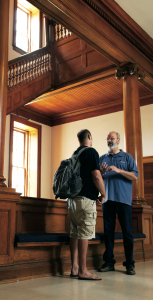
Christians are characteristically convinced of the importance of mentoring because of the deep way it is embedded in their faith. Understanding God as Trinity presses on us the conviction that loving relationships are at the center of reality. We note that Jesus’ own ministry was centered on the mentoring of the Twelve, and especially the Three. This focus on the intensive formation of a “school of thought and practice” accounts in large part for the durable power of Jesus’ influence. Further, the maintenance of convictional and corporate identity in a minority movement also requires intensive and influential relationships. This is particularly the case for a minority not based in ethnicity or geographical concentration, but on distinctive beliefs that are not accepted and even arouse hostility in the wider cultural milieu. Finally, we are reminded of Jesus’ summary of God’s commandments. Unconditional love to God and love to neighbor of the sort we show to ourselves are the hallmarks of discipleship in the Kingdom of God.
The essence of the Kingdom is relational. Relationships are central to everything we do and everything we believe. If God’s greatest commandments are as inclusive as I believe they are, when life is over and we receive our report card, it will only have one category—relationships.
There will be three lines:
- How did we relate to God?
- How did we relate to ourselves?
- How did we relate to others?
We know God’s report card contains three categories because Jesus told us. When the teacher of the law asked Jesus, “ Of all the commandments, which is the most important?” the entire created order held it’s collective breath, straining to hear His answer. Jesus replied that the Shema was the greatest: “Hear, O Israel, the Lord our God, the Lord is one. Love the Lord your God with all your heart, and with all your soul and with all your mind and with all your strength.” However, he did not stop there: The second is this: love your neighbor as yourself.” There is no commandment greater than these. (Mark 12:28-31)’This commandment must be the first guideline for all of life’s decisions and actions. (Richard Swenson. “Overload and relationship: building margin for joyful leadership.” Leadership Academy Report. 2004).
Small wonder, then, that the intellectual life and the life of academic collegiality are properly centered in and empowered by loving relationships. Mentoring as an intellectual practice shows its great promise and power for breaking the “scandal of the evangelical mind” and bringing the next generation of evangelical faculty into the academy better prepared and equipped for their vocations under the triune God.
— The conclusion to A Christian Theology of Mentoring by Nan Thomas (Associate Director of Faculty Development, Union University and InterVarsity Faculty Ministry) and Thomas Trevethan (InterVarsity Faculty Ministry). We encourage mentors and mentees (many of us serve in both roles) to read and find opportunities to discuss A Christian Theology of Mentoring as the new academic year opens. Recommendation: discuss the piece over a series of weeks giving attention to each of the major sections.
Note: A Christian Theology of Mentoring was originally presented September 24, 2005, as part of the Faculty Mentoring Conference, hosted by the Maclaurin Institute, a Christian study center serving the University of Minnesota. The conference was co-sponsored by the Maclaurin Institute, the Emerging Scholars Network, and Campus Crusade’s Christian Leadership Ministries.Tom enjoys daily conversations regarding living out the Biblical Story with his wife Theresa and their four girls, around the block, at Elizabethtown Brethren in Christ Church (where he teaches adult electives and co-leads a small group), among healthcare professionals as the Northeast Regional Director for the Christian Medical & Dental Associations (CMDA), and in higher ed as a volunteer with the Emerging Scholars Network (ESN). For a number of years, the Christian Medical Society / CMDA at Penn State College of Medicine was the hub of his ministry with CMDA. Note: Tom served with InterVarsity Christian Fellowship / USA for 20+ years, including 6+ years as the Associate Director of ESN. He has written for the ESN blog from its launch in August 2008. He has studied Biology (B.S.), Higher Education (M.A.), Spiritual Direction (Certificate), Spiritual Formation (M.A.R.), Ministry to Emerging Generations (D.Min.). To God be the glory!

Thanks, Tom! I really appreciated this. I especially like the way that it grounds the importance of mentoring so deeply in the character of God.